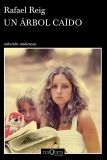


In 1979, a group of friendly families comment on the return of an old acquaintance who will disturb the life in their residential estate. They all know one another due to having been active in anti-Franco political parties. Twenty-five years later Julián, the son of one of them, sets out to reconstruct what has become of them, their children, their successful professional careers, some in large companies, others following literary careers. While telling their stories, Julián hopes to shed light on a number of dark areas: who betrayed his mother in the sixties, why did that acquaintance return in that very year, how were those moments of apparent hope and happiness destroyed in 79, and why had he and his friends never been able to make a place for themselves in the world? In his excavation into the past, Julián uncovers the chess game the friends played that year, a metaphor for the decisions, triumphs and defeats of a country.
Rafael Reig’s novel Un Árbol Caído Tree is an intriguing novel set during Spain’s transition from dictatorship to democracy in which he charts the fortunes of a group of friends who have themselves undergone a transition from young communists to middle-aged bourgeois citizens. The novel opens in 1979 as the news spreads that a former friend and comrade, Luis Lamana - also known as Fatty - is to return to Spain after spending years in America and his return will have major repercussions for all three couples - Alejandro and Lola, Pablo and Alicia, Ricardo and Carlota - as well as their children.
One of the strengths of this novel is the chess metaphor that extends throughout - the game between Alejandro and Pablo that begins on that fateful evening is played out move by move, chapter by chapter - full of mistakes and false moves. It provides a fascinating backbone for Reig to hang his story.
This is an intriguing and involving novel (…)
From the reader´s report by Laura McGloughlin [3]
Links:
[1] http://217.160.225.169/node/33481
[2] http://217.160.225.169/node/35308
[3] http://217.160.225.169/bio/laura-mcgloughlin
[4] mailto:asegrelles@tusquets-editores.es
[5] http://www.tusquetseditores.com